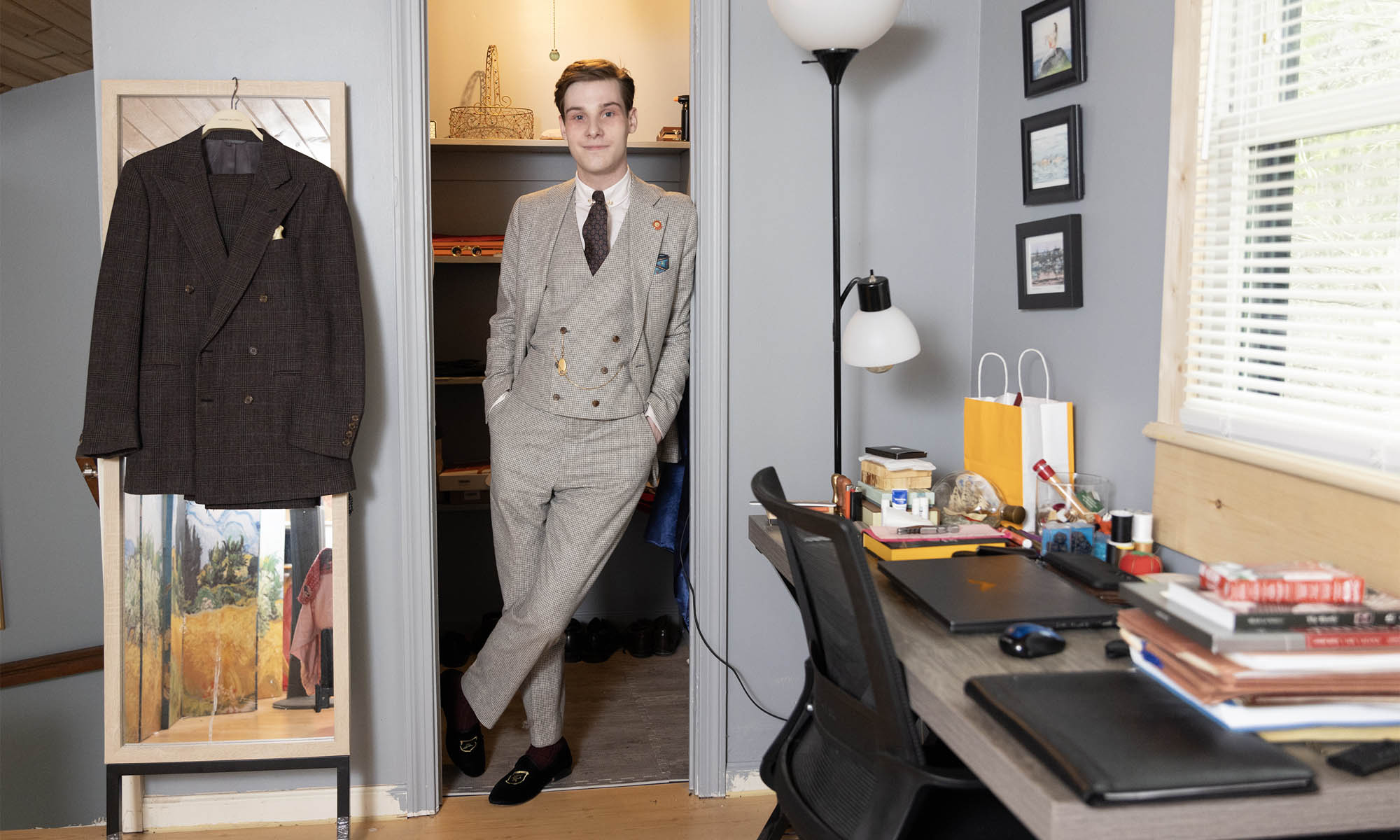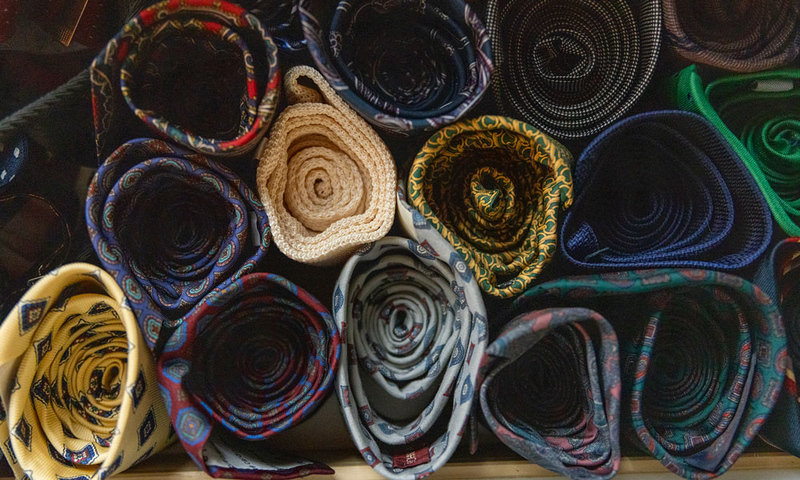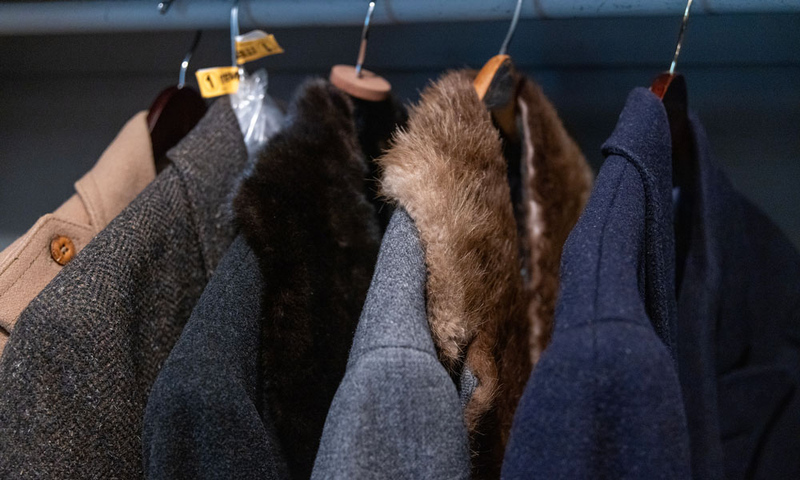Sam Culyer’s first clue that something was up came as he crossed the Denison campus one day, back when he was still a student.
“Someone tried to take a picture of me when I was walking, and I thought, ‘That’s weird,’” he says.
Weird maybe, but also harmless, and he didn’t dwell on it. The little mystery was forgotten until a friend who was more active on social media let Culyer know that he had become something of a campus celebrity.
His fellow students, it seemed, had given him a nickname.
“You’re ‘Suit Kid,’” she told him.
Culyer, you see, wears suits. Only suits.
“I don’t own any other clothes, so it’s difficult to wear anything else,” he says.the
At latest count he owns 36 suits, including tuxedos. His favorite is a blue three-piece suit his father gave him upon graduation.
Wear a nice suit every day to class and you’re bound to be noticed, as Culyer was. There was even some lamentation on social media when it was announced that Suit Kid had graduated early, in three years, and would not be back for his fourth year.
Then, shortly after that, came another social media announcement: “Suit Kid is back! He’s working at the library!”
Culyer grew up in northern Kentucky, just across the Ohio River from Cincinnati. His mother teaches at a Montessori school, and his father runs a business that helps people find living arrangements for aging family members.
“I’m proud of both my parents,” Culyer says. “They’re good people.”
He says he wanted to dress well even when very young, but he started wearing suits on a daily basis around the eighth grade. He developed a taste for nice things, but he says it is only partly about the things themselves.
“It turned into a self-improvement project,” he says. “How can I be a better person? In some ways, it taught me confidence. I would like to know exactly what to do, in a gentlemanly fashion, in every situation.”
So he learned about not only men’s formal wear, but etiquette and manners. How to set a table. How to wear a pocket watch. How to greet someone, shake their hand, and carry on a conversation. As a teen, he started working at a fine dining restaurant and devoted himself to learning as much as possible about wine.
He loves to write, and Denison was recommended to him by an administrator at his high school. He visited campus, talked with creative writing faculty, and was sold.
“After three years here, I can say that my writing is infinitely better,” he says.
He had a short story published in the Allegheny Review, and he wrote not one, not two, but three novels as a student — he finished a fourth since graduation. Culyer viewed his return to Denison as a “betweener situation,” one in which he could write, save some money, and chart his next steps while spending a little more time at a place that came to mean much to him. When not at the library as circulation supervisor, you could find him working at the Village Wine Co.
He planned this as a gap year of sorts, and Culyer says a Denison professor made it possible: Fred Porcheddu-Engel ’87, chair of the English department and Culyer’s landlord. He and his husband, Vince, offered Culyer a room at an annual rent that was impossible to resist.
One dollar.
“His dollar is still on a magnetized clip on the side of the refrigerator,” Porcheddu-Engel says. “Actually, he did something to the dishwasher and we had to fix it, so I punished him by doubling his rent. So now there are two dollar bills on the side of the fridge.”
Porcheddu-Engel is among Denison’s most memorable professors and has inspired generations of Denisonians since he began teaching on The Hill in 1992. But his room-and-board offer to Culyer was a first.
“It’s not every day that I’m OK with somebody coming to live in my house,” he says. “He’s the only one.”
Porcheddu-Engel calls Culyer “one of the most naturally curious people that I have ever known.”
“He is the most well-read and knowledgeable — about arts, music, high culture, and pop culture — of just about any Denison student I have ever met,” he says. “Sometimes I think he’s read almost as much as I have, and I’ve never encountered that before. I can make obscure references to 19th-century literature, and he picks them up.
“He is fascinating, and he is fascinated,” Porcheddu-Engel says. “That’s rare, and it’s just wonderful.”
Culyer’s time in Granville concludes in May. He is returning to Cincinnati to finish revisions on his latest novel and consider future prospects.
He is ready to shed his “Suit Kid” moniker, but he cherishes Denison and its role in his personal growth. His professors challenged him and revealed a larger world of possibilities.
“The opportunities to be a polymath here are endless,” Culyer says. “Denison taught me that you can do that in the modern age. There is no shortage of things to try.”
Porcheddu-Engel suspects that Culyer’s peers picked up on, and appreciated, his positivity and sincerity when they gave him his nickname.
“This is not a mask he puts on,” Porcheddu-Engel says. “This is who he is. There is an elegance to him that people respond to.”
He doesn’t know what the future holds for his former student, but he can’t wait to find out.
“There are lots of things that he could do, like so many Denison graduates,” Porcheddu-Engel says. “He’ll be where he decides he wants to go. Denison is a place where your individuality can blossom. He is living proof of that.”







